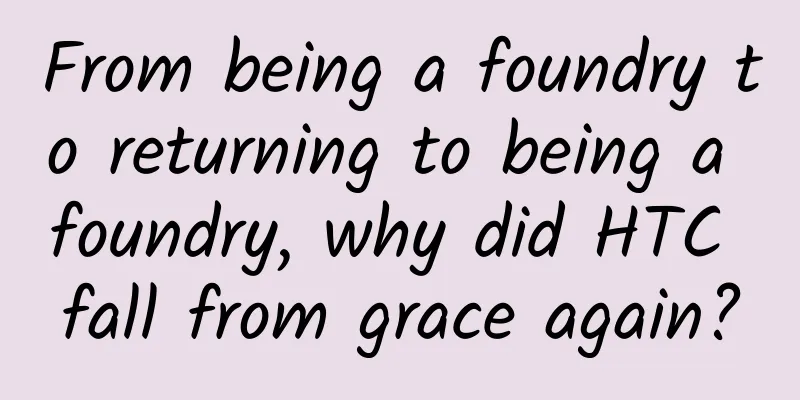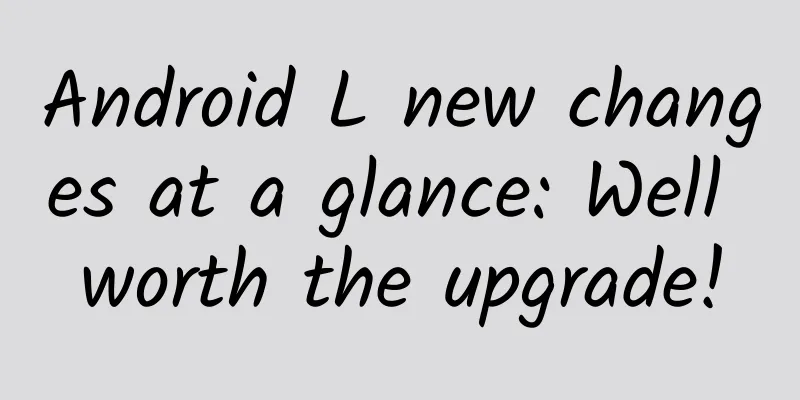From being a foundry to returning to being a foundry, why did HTC fall from grace again?

|
When HTC (HTC Electronics) sees Samsung, Huawei, OPPO and vivo sweeping the world, it must be thinking back to the days when it used Android as a weapon to compete with Apple and squeezed Samsung into a corner. In the past five years when Android phones grew fastest, HTC missed opportunities again and again, ignoring the surging waves of change around it, until it was swallowed up by the trend of the times. On September 21, Google and HTC signed an acquisition agreement, the core content of which is that Google will acquire the HTC team involved in building Pixel phones for $1.1 billion, and obtain HTC intellectual property authorization (non-exclusive). After divesting its core assets, HTC will continue to develop mobile phones and VR (virtual reality) businesses, which may be a good enough choice for HTC, which has a market value of only $1.9 billion. Google, which owns the largest mobile operating platform, has repeatedly tried mobile terminals, launching terminal products including Google Glass, VR glasses, Google Home smart speakers, etc. However, after acquiring HTC's business, Google's mobile terminal development may focus on smartphones, and Google's "AlphaGo" that swept the world's chess players finally has a place to use. From the OEM to the OEM From 1997 to 2017, HTC has taken a parabola of rapid rise and fall, with 2011 as the turning point. Looking back at HTC's history, HTC was founded in 1997 as a humble and ambitious foundry. It was not until 2000 that it cooperated with Compaq (now merged into HP) to produce the handheld computer iPAQ with Windows CE system, which stood out among the cookie-cutter foundry companies. Taking advantage of Microsoft's efforts in the mobile era, HTC seized the opportunity and became the top manufacturer of Windows phones, accounting for up to 80% of the market share of Microsoft system phones. The cooperation with Microsoft helped HTC win a global reputation, and HTC also expanded its territory to the world at a very low cost. In 2006, HTC transformed from a mobile phone OEM to an independent brand. In 2005, Google acquired Android and continued to develop an open source operating system based on Linux and suitable for mobile devices. HTC joined the Android Alliance led by Google and launched the world's first Android phone, T-Mobile G1, in 2008 in cooperation with telecommunications operator T-Mobile. After jumping on the Google ship, HTC began its most glorious period. According to a report by consulting firm Nielsen, HTC ranked second among global smartphone manufacturers with a market share of 21% in 2011, second only to Apple, which had a market share of 29%. In the US market, HTC's market share exceeded Apple in the third quarter of 2011. On April 6, 2011, HTC's stock price reached the integer mark of NT$1,200, and its market value soared to more than US$33.5 billion, surpassing Nokia and RIM to become the world's second largest mobile phone manufacturer after Apple, reaching its historical peak. But since then, HTC's fortunes have suddenly reversed. In the second half of 2011, HTC, as a representative of the Android camp, was sued by Apple for patent infringement, and its key products were banned from import by the United States. This lawsuit was seen as a turning point in HTC's decline in the European and American markets. But in fact, Apple also filed a lawsuit against Samsung's Galaxy series at the same time, but HTC failed to stand up like Samsung. The failure to regain its glory is closely related to the products launched by HTC. In 2012, HTC launched its flagship product One series, which used Nvidia chips and had many problems, and was defeated by the competing products Samsung S3 and Apple iPhone 4S in the same year; in 2013, HTC imitated Apple and launched only one high-end mobile phone M7, which featured a conceptual 400w pixel camera, but had problems with the yield rate and was also defeated by the competing products S4 and iPhone 5. In 2014, HTC launched M8, which still lacked innovation and had a high price, and the market response was dismal. "What HTC can do, Huawei can also do, and at a cheaper price. The innovation speed of mainland brands is much faster than that of HTC. In the high-end market, HTC has a huge gap in supply chain capabilities compared with Samsung and Apple. It has made repeated mistakes in market strategies and missed the mainland market at the most important time," said Wang Yanhui, Secretary-General of the China Mobile Alliance. In 2015, brands such as Xiaomi, Huawei, OPPO, and vivo have risen strongly, firmly occupied the mid- and low-end markets, and began to exert their strength in the high-end market. HTC has been stationed in high-priced products, but has never produced products that can compete with Apple, Samsung, and Huawei. This year, HTC's flagship mobile phone M9 collapsed, and the company announced layoffs in August of the same year. In 2016, HTC began to sell its land in Shanghai to make up for the shortfall in performance. At this point, HTC's mobile phone business is destined to be sold. According to the latest global smartphone market ranking released by IDC on September 20, HTC's mobile phone market share is less than 1%, only 0.68%. In terms of performance, HTC has suffered losses for 9 consecutive quarters. Before the announcement of the transaction, the market value of its parent company HTC was only 1.9 billion US dollars. After the core assets are sold to Google, HTC will return to the OEM (original equipment manufacturing) position. In 20 years, HTC has come full circle and is back to square one. Hardware trial and error is expensive The world outside has been changing, but some companies are still living in a static history and refuse to wake up. Other companies in this situation include Nokia, Motorola, Blackberry, etc. However, compared with Nokia and Motorola, which made a wrong bet on the system direction and ended up with a big tail, HTC, which had a wonderful start in the Android era, turned a good hand into a loser, which is really sad. Looking at the failures of large companies in recent years, there is a pattern that most of them are hardware manufacturers, while software companies rarely make mistakes. Even Microsoft, which missed the mobile era, has set new market capitalization records. This is closely related to the high trial and error costs of hardware companies. The Samsung S7 explosion incident is estimated to have caused a loss of nearly $17 billion. If it were any hardware company other than Apple and Samsung, it would probably be a disaster. The span from project establishment to sales of a mobile phone product may be more than a year. HTC and BlackBerry have had several consecutive product failures, and the investment costs are so huge that it is difficult to turn back. In addition, the premium of pure hardware products is decreasing. In the Internet era, user traffic has become an important value judgment standard, and users and traffic are mostly controlled by software companies, so hardware companies are "making wedding clothes". Because of the Internet attributes of the iOS system, Apple has become the only mobile phone company that controls users through a closed system platform, which has also brought Apple higher income and negotiation power. In contrast, Nokia, HTC and even today's Huawei, after investing huge R&D expenses, have very weak control over users, even "zero interaction", and weak negotiation rights with software platforms. Many hardware companies seem to have seen this and started to pay attention to user contact. According to the 2016 data of Huawei App Market, the number of users reached 600 million, the number of application downloads reached 45 billion times, and the total number of applications distributed throughout the year reached 45 billion. The development of huge traffic is expected to bring higher added value. Google's ambitions Compared with PC, mobile phone is a new generation computing platform. What is the next computing platform? Previously, most companies thought it was VR, but now Apple, Google, and Huawei are all focusing on artificial intelligence. Google, which saved HTC, is a pioneer in the era of artificial intelligence. It is at the forefront of the world in both big data analysis and artificial intelligence algorithms. Google's open Android system is already the largest mobile operating system. In early March this year, Android officially surpassed Microsoft Windows and became the most active operating system for users. However, compared with the huge revenues that Windows and iOS systems have brought to Microsoft and Apple, the open Android has not brought direct revenue to Google. Google has also tried to gain some ground on the mobile operating platform. Last year, there were several reports that Google wanted to return to the Chinese market and demanded to share the application revenue with Chinese mobile phone companies. Thanks to its control over the closed system, Apple also has important "Apple tax" income. All manufacturers must provide Apple with 30% of the revenue share for internal consumption and purchases through iOS software. In the first half of the year, Apple's revenue share reached 5 billion US dollars, becoming one of Apple's most important sources of service revenue. If Google can get a share of the Android system, its status will be comparable to Microsoft. Judging from its investment in Google Glass, VR glasses, AlphaGo, and Google Home smart speakers, Google is a technology company that has a long-term vision in the field of artificial intelligence and is willing to make continuous trials and errors. However, its research and development of mobile terminals other than mobile phones has not achieved gratifying results. Neither glasses nor speakers have shown the ability to become the next computing platform. Apart from playing chess, AlphaGo is useless. By acquiring HTC, Google may regard mobile phones as the next important platform for artificial intelligence. Pixel is also the first phone equipped with Google Assistant, which means that Google has realized the advantages of artificial intelligence on the terminal. In addition, Pixel is also the first smartphone to support Google's Daydream plan. Daydream is a VR standard platform created by Google, which can be understood as Android in VR. It can be seen that Google has high hopes for the new generation of smartphones. In the acquisition of HTC, Google did not include all of HTC's mobile phone business and VR, but only recruited HTC team members and related employees who originally participated in the creation of Pixel phones. Pixel is a series of mobile phones officially launched by Google on October 5 last year. Unlike the Nexus series of mobile phones that use the OEM model and the hardware production capacity is entirely handled by the hardware manufacturer, Google has increased its control over Pixel phones. In addition to the hardware OEM being completed by HTC, Google controls the integration of software and hardware. Previously, Google has always insisted on openness in its systems, and the Pixel phone reflects Google's change in strategy. After the acquisition of HTC is completed, Google will go from having only a completely open Android platform to owning software, hardware and artificial intelligence computing platforms for mobile terminals. Google may follow Apple's iPhone and launch a hit mobile phone with integrated artificial intelligence capabilities. After all, mobile phones are still the most suitable mobile terminals for large-scale computing in the short term. Whether it is VR or artificial intelligence, mobile phones will be the core link in the short term. In addition, Apple and Huawei have already started to lay out in the direction of artificial intelligence, and Google is not willing to lag behind. As a winner of Toutiao's Qingyun Plan and Baijiahao's Bai+ Plan, the 2019 Baidu Digital Author of the Year, the Baijiahao's Most Popular Author in the Technology Field, the 2019 Sogou Technology and Culture Author, and the 2021 Baijiahao Quarterly Influential Creator, he has won many awards, including the 2013 Sohu Best Industry Media Person, the 2015 China New Media Entrepreneurship Competition Beijing Third Place, the 2015 Guangmang Experience Award, the 2015 China New Media Entrepreneurship Competition Finals Third Place, and the 2018 Baidu Dynamic Annual Powerful Celebrity. |
>>: In the bitter winter, why is it Xiaomi that helps Xiaopeng Electric Vehicles survive?
Recommend
A must-read for marketers! The underlying logic of hot products
What is a hot product? This is a good question an...
Will eating these things often really make you ugly? Beware of these 8 types of food
Someone once complained online: "Why do I fi...
Content consumption apps: QQ Reading, Get, Himalaya FM, which one is better?
Imagine that you get up in the morning and sit on...
Inventory of 6 skills and tools for short video operations!
"With the continuous changes in the mechanis...
China Broadcasting and Television Network is listed: facing the problem of cable TV network integration
After four years, China Radio and Television Netw...
App Promotion Tips: How to Promote a New App?
Since I often write about App promotion, friends ...
How to effectively identify malicious clicks? How can websites prevent malicious clicks?
If you are a bidding veteran, you should know tha...
How to add friendly links to the website? How much do you know about the style and location of friendly links?
Website optimization includes two aspects: intern...
How to operate your Zhihu? Just read this article!
Whether from the perspective of user growth or us...
Zheng He made seven voyages to the West, with a crew of 30,000 people. Why were there women and midwives accompanying him?
Zheng He was a famous navigator in ancient my cou...
Autonomous driving is still too far away? These scenarios will be applied first
Unmanned driving is the direction of future devel...
How to build a multi-channel integrated marketing knowledge system?
With the rapid development of the Internet and mo...
Google reveals more about integrating Rust into Android
Since 2019, the Android team has been working on ...
Attract 150,000 fans in 10 days with 0 cost. It turns out that the AARRR model can be used in this way!
After reading many articles about the AARRR model...









